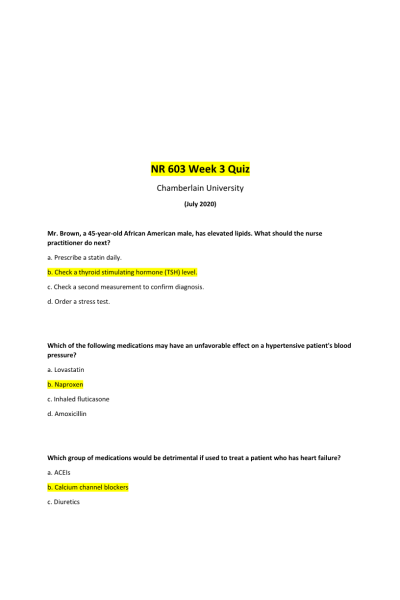NR 603 Week 3 Quiz
-
$30.00
| Institution | NR 603 Advanced Clinical Diagnosis and Practice Across the Lifespan |
| Contributor | Sharonda |
- Question: Mr. Brown, a 45-year-old African American male, has elevated lipids. What should the nurse practitioner do next?
- Question: Which of the following medications may have an unfavorable effect on a hypertensive patient's blood pressure?
- Question: Which group of medications would be detrimental if used to treat a patient who has heart failure?
- Question: A patient with hypertension has been diagnosed with gout. Which home medication may have contributed to this episode of gout?
- Question: What group of BP medications should be discontinued immediately if pregnancy occurs?
- Question: What are the classic symptoms of DVT?
- Question: Why are the carotid arteries assessed for bruit?
- Question: What is a common side effect of thiazide diuretics in males?
- Question: An older adult who has hypertension also has osteoporosis. Which antihypertensive agent would have the secondary effect of improving her osteoporosis?
- Question: In older adults, the three most common ailments are:
- Question: An older adult has renal insufficiency, hypertension, osteoarthritis, hypothyroidism, and varicose veins. Which medication should be avoided?
- Question: The correlation between blood pressure and age greater than 60 years is that as age increases:
- Question: The lipid particle with the greatest atherogenic effect is:
- Question: A 55-year-old male is obese, does not exercise, and has hyperlipidemia. His average blood pressure is 150/90 mmHg. How should he be managed today?
- Question: An 80-year-old female who is otherwise well has the following blood pressure readings. 178/70 How should she be managed pharmacologically?
- Question: 74-year-old patient has peripheral artery disease (PAD). Which item listed below is an important non-modifiable risk factor for PAD?
- Question: A 60 year old male with a history of type 2 Diabetes and HTN comes in for a follow up blood pressure check to evaluate the recent medication/diet/exercise plan you prescribed at his visit 3 months ago. His BMI is 20. His Blood pressures sitting and standing are:
- Question: 138/80 and 132/76 respectively. What is the best analysis of the prescribed treatment plan?
- Question: You are reviewing the labs of a 50 year old female patient who presented to you for a physical exam. You note, upon review of her labs, that her triglycerides are 670. Triglyceride levels over 500 raise immediate concern for which of the following disorders?
- Question: A 44 year old male patient presents to the clinic for evaluation of an episode of chest tightness that radiated to his back that he had earlier in the day when he was out for a walk. He states that once he came home and sat down, the chest tightness resolved. What is the most likely cause of his chest tightness?
- Question: A 52 year old caucasian male with a past medical history of COPD comes in for follow up on his stage 2 HTN. Hydrochlorothiazide is at the maximum dose and a new medication needs to be added. Which medication would be the best second line therapy?
- Question: Which of the following drugs does the 8th Joint National Committee (JNC8) 2014 Evidence Based Guidelines for the Management of High Blood pressure in adults recommend for the treatment for Caucasian males with microalbuminuria?
- Question: Exercise Tolerance Test (ETT) is the first line approach to detecting CAD in stable patients. However ETT is contraindicated for some patients. Knowing when to consult with specialists is an important part of NP practice. Which patient should be referred to cardiology prior to ordering an exercise tolerance test?
- Question: A 60 year old female patient presets to the clinic stating she had right arm and jaw pain about 2 hours ago along with "sweating" and shortness of breath. An EKG is performed immediately and reveals ST elevation in several leads. This clinical picture is consistent with:
- Question: A sedentary 58 year old African American female is here for her annual visit. Her VS are BP 130/70, HR 82, RR 18 BMI 30 Ht 5.2, works as an accountant in a law firm. Her past medical history includes and she states she'd like to begin training for a 10k marathon with some ladies at work. Per ACA/AHA guidelines your recommendations include
- Question: Exercise stress test results have a higher false positive rates in women then men because:
- Question: A 60 year old woman comes into the clinic complaining of nausea, shortness of breath and a dull pain in the middle of her back while playing tag in the yard with her granddaughter yesterday. Her past medical history includes CAD, Type 2 DM, and HTN. Lab work reveals negative troponins. The most appropriate diagnostic testing includes:
- Question: A 58 year old male presents to the clinic with a several year history of uncontrolled hypertension. You perform your physical assessment. Which group of physical findings is commonly seen in target organ change in uncontrolled hypertension?
- Question: This hypertensive drug is the first choice for diabetic and renal failure patients per National Guidelines:
- Question: The leading cause of death for women in the United States is:
- Question: An 82 year old obese female patient presents to the clinic complaining of gradually increasing shortness of breath, weight gain of 4 pounds in the last week and atrial fibrillation on EKG. The most likely cause of her symptoms is:
| Instituition / Term | |
| Term | Fall 2020 |
| Institution | NR 603 Advanced Clinical Diagnosis and Practice Across the Lifespan |
| Contributor | Sharonda |




















